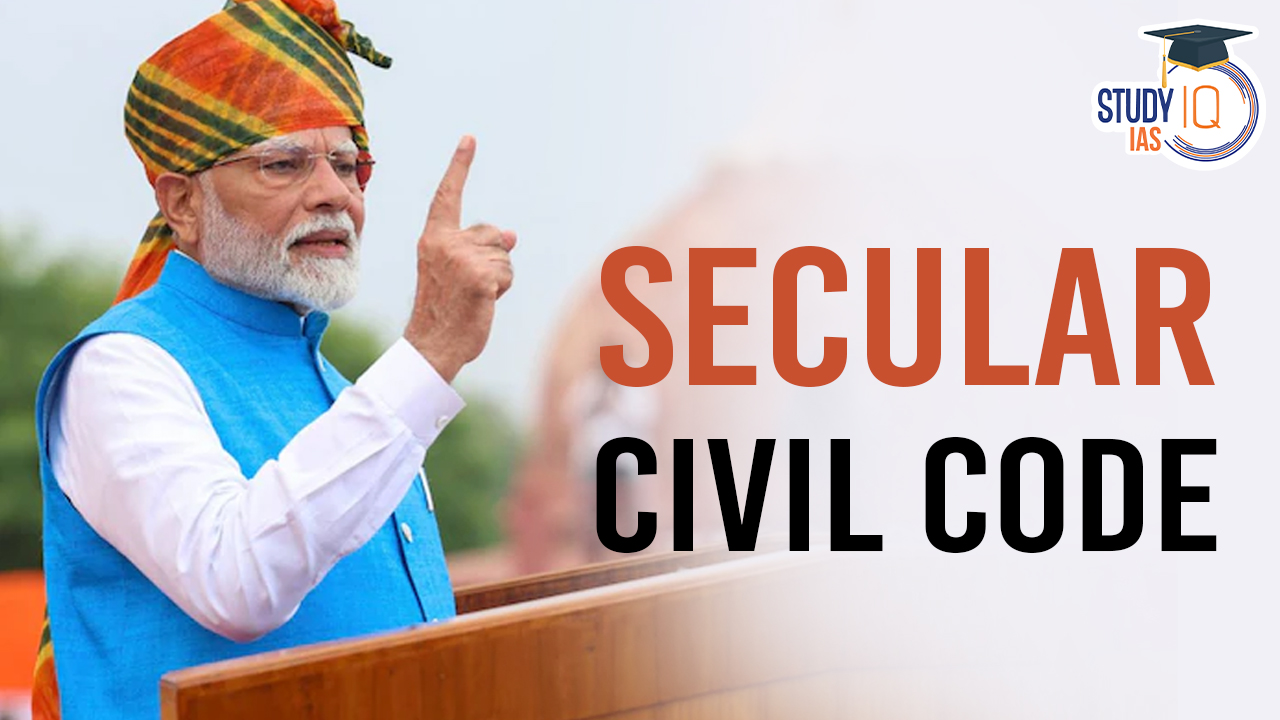Table of Contents
Context
In his 11th consecutive Independence Day speech Prime Minister Narendra Modi reiterated the BJP’s ideological commitment to implementing a Uniform Civil Code (UCC).
More in News
He presented the UCC as a “secular civil code” rooted in the Constitution, emphasising it as a means to ensure equality before the law for everyone.
About Uniform Civil Code (Secular Civil Code)
The concept of a Secular Civil Code, also often referred to as a Uniform Civil Code (UCC), is a legal framework in India that would standardize personal laws across all religious communities, replacing the existing system where different religions are governed by their own laws. The idea behind the UCC is to ensure equality and justice for all citizens, irrespective of their religion, by bringing uniformity in laws related to marriage, divorce, inheritance, adoption, and maintenance.
Uniform Civil Code And It’s Background
- A Uniform Civil Code (UCC) is a proposal to create a single set of laws applicable to all citizens of a country, irrespective of their religion or personal beliefs, in matters related to civil affairs such as marriage, divorce, inheritance, adoption, and property rights.
The idea of a Uniform Civil Code (UCC) in India has a long history that is closely tied to the country’s complex socio-political and religious landscape.
- Pre-Independence Era:
- The concept of a UCC was discussed during the British colonial period in India, and various attempts were made to bring about uniformity in laws related to marriage, inheritance, and succession.
- The British introduced laws like the Indian Succession Act (1925) and the Indian Divorce Act (1869), which applied to certain religious communities and sought to bring uniformity in personal laws.
- Post-Independence Era:
- After India gained independence in 1947, the framers of the Indian Constitution, under the leadership of Dr. B.R. Ambedkar, debated the inclusion of a UCC.
- However, due to concerns about potential religious sensitivities and to secure the support of various religious communities, it was decided to include Article 44 in the Directive Principles of State Policy.
- Article 44 of the Indian Constitution, which falls under the Directive Principles of State Policy, states that “The State shall endeavour to secure for the citizens a uniform civil code throughout the territory of India.”
- After India gained independence in 1947, the framers of the Indian Constitution, under the leadership of Dr. B.R. Ambedkar, debated the inclusion of a UCC.
The inclusion of Article 44 reflects the vision of the framers to eventually bring about a UCC in India. However, Article 37 emphasises that they cannot be enforced in court. But they are nonetheless very important for the country’s government.
|
Supreme Court’s Key Interventions on Behalf of the UCC |
|||
| Year | Case | Background | Outcome |
| 1984 | Jordan Diengdoh v. SS Chopra | A Christian woman married to a Sikh man under the Indian Christian Marriage Act, 1872, sought nullification of her marriage under the Indian Divorce Act, 1869. | The Court only granted a decree of separation due to lack of an enabling provision under the Indian Divorce Act prompting the SC to point once again to the UCC. |
| 1985 | Mohd. Ahmed Khan v. Shah Bano Begum | Shah Bano Begum was a 62-year-old Muslim woman who was divorced by her husband, Mohammed Ahmed Khan, in 1978 after 43 years of marriage. Khan, a well-known lawyer, refused to provide any maintenance for Shah Bano, who was left destitute with their five children. | ● The Supreme Court of India granted support to a divorced Muslim lady in this landmark case under Section 125 of the Code of Criminal Procedure.
● However, the government eventually overturned this decision by enacting the Muslim Women (Protection of Rights on Divorce) Act, 1986, which limited Muslim women’s maintenance rights. ● The Supreme Court’s initial judgement in this case emphasised the need for a UCC to promote gender equality and national integration. |
| 1995 | Sarla Mudgal v. Union of India | A Hindu woman moved court against her husband who tried to solemnise a second marriage after converting to Islam
|
● The SC ruled that a marriage without dissolution of the first marriage would be considered void.
● The court highlighted the importance of a UCC in addressing the disparities in personal laws. |
| 2014 | Shabnam Hashmi v. Union of India | A social activist had moved court to be permitted to adopt a child and ensure her the due rights. Islamic personal law does not recognise adoption and allow for the same rights to be vested on an adopted child as on a biological child. | The court stated that adoption is the fundamental right of every citizen irrespective of their caste, creed, or religion.
It was permitted to adopt a child irrespective of religion or caste following the Juvenile Justice (Care And Protection) Act 2000. |
| 2017 | Shayara Bano v. Union Of India (popularly known as ‘Triple Talaq Case’) | Shayara Bano was a Muslim woman who was married to Rizwan Ahmed for 15 years. In 2016, Ahmed divorced Bano through the practice of talaq-e-biddat, or instant triple talaq, without her consent. Bano filed a writ petition in the Supreme Court challenging the constitutionality of talaq-e-biddat, polygamy, and nikah halala. | ● The Supreme Court declared the practice of instant triple talaq (talaq-e-biddat) among Muslims to be unconstitutional and struck it down. The court observed that triple talaq was arbitrary and violated the fundamental rights of Muslim women.
● While not directly related to a UCC, the judgement reiterated the need for uniformity and gender equality in personal laws. |
| 2020 | ABC v. the state (NCT of Delhi) | A Christian woman who had given birth to a child out of wedlock. She had filed a petition in the guardian court under Section 7 of the Guardians and Wards Act, 1890, seeking to be appointed as the child’s legal guardian. The guardian court dismissed her petition on the ground that she was required to give notice to the father of the child, even though he had not shown any interest in being involved in the child’s life. | The Supreme Court of India, held that an unwed woman belonging to the Christian faith can become a legal guardian of her child without the father’s consent. |
Arguments in Favour of Implementing the UCC
- Simplification of Legal System: Proponents argue that the UCC would simplify India’s complex legal system, which currently has separate laws based on religious beliefs, such as the Hindu code bill and Sharia law. The UCC aims to streamline laws related to marriage ceremonies, inheritance, succession, and adoptions, making them uniform for all citizens regardless of their faith.
- Promotion of Gender Equality: Advocates contend that the UCC is essential to promote gender equality. Many religious or customary personal laws are seen as biased in favour of men, violating fundamental rights guaranteed under Article 21 of the Constitution.
- Judicial Support: Several judicial pronouncements from higher courts have supported the introduction of the UCC.
- Example: The landmark case of Mohd. Ahmed Khan v. Shah Bano Begum in 1985 affirmed a woman’s entitlement to maintenance even after the completion of the iddat period.
- Jordan Diengdeh vs SS Chopra in the same year emphasised the urgency of implementing the UCC.
- The Supreme Court reiterated the need for Parliament to frame a UCC in the Sarla Mudgal v. UoI case in 1995, emphasising its role in national integration.
- Separation of Religious and Secular Activities: The UCC is seen as a means to segregate religious and secular activities. It affirms that religion is a matter of individual faith and should not be mixed with secular activities, which can be regulated by the State through legislation.
- Promotion of National Integration: Advocates argue that the UCC would promote national integration by replacing different laws for various religious groups with a single, secular law governing personal matters. This unity is believed to foster a sense of oneness and national spirit.
- Example: The landmark case of Mohd. Ahmed Khan v. Shah Bano Begum in 1985 affirmed a woman’s entitlement to maintenance even after the completion of the iddat period.
Arguments Against the UCC
- Existence of Uniform Civil Laws: Critics contend that India already follows a uniform code in most civil matters, such as the Indian Contract Act, Code of Civil Procedure, Sale of Goods Act, Transfer of Property Act, Partnership Act, and Evidence Act.
- States have made numerous amendments, leading to diversity even under these secular civil laws.
- Jurisdiction Issues: They argue that Parliament does not have exclusive jurisdiction over personal laws, as “personal laws” are mentioned in the Concurrent List, not the Union List.
- Potential Violation of Fundamental Rights: Opponents argue that a UCC may contradict fundamental rights guaranteed under Article 25 (the individual’s right to religion), Article 26(b) (the right of each religious denomination to manage its own affairs in matters of religion), and Article 29 (the right to conserve distinctive culture).
- Lack of National Consensus: Additionally, opponents argue that there is a lack of national consensus on the UCC, with many organisations advocating for the rights of minorities and religious clerics opposing it.
- Codify Personal Laws: The Law Commission’s 2018 consultation paper suggested codifying personal laws rather than implementing a UCC.
Way forward
- Legal Reform and Legislation: The government can introduce comprehensive legislation in Parliament to enact a UCC.
- This legislation should be drafted with the input of legal experts and stakeholders to ensure that it respects individual rights while promoting uniformity.
- Example: The introduction of a UCC bill in Parliament would be a significant step forward, similar to the introduction of the Uniform Civil Code Bill in the 1950s.
- Public Discourse and Consultation: Engaging in a national conversation and seeking the opinions of various religious and social groups is crucial. Public consultations and open forums can help in understanding and addressing concerns.
- Example: The 22nd Law Commission headed by Justice (Retd) Rituraj Awasthi issued a notification to elicit views from various stakeholders — including public and religious organisations — on the UCC.
- Consensus Building: Building a consensus among political parties and religious communities is essential. Politicians and leaders from various backgrounds should come together to discuss and negotiate the terms of the UCC.
- Example: The government could take inspiration from previous instances where political consensus was reached on critical issues.
- Pilot Programs and Gradual Implementation: The UCC can be implemented in a phased manner, starting with certain aspects like marriage and adoption laws, and gradually expanding to cover other areas.
- Example: The Goa Civil Code, which applies a UCC-like system, has been in place for decades and can serve as a model for gradual implementation.
- International Comparisons: Studying the experiences of other countries that have successfully implemented similar reforms can provide valuable insights.
- Example: Learning from the experiences of countries like Turkey, which adopted a UCC as part of its modernization efforts.
- Constitutional Amendments: If necessary, amendments to the Indian Constitution may be proposed to clarify the legal framework for a UCC.
- Example: The 42nd Amendment Act of 1976 made changes to the Directive Principles of State Policy, emphasising the promotion of a UCC.


 Places in News for UPSC 2025 for Prelims...
Places in News for UPSC 2025 for Prelims...
 New Phase of Operation Chakra to Combat ...
New Phase of Operation Chakra to Combat ...
 Soyuz Aircraft: History, Design and Sign...
Soyuz Aircraft: History, Design and Sign...





















